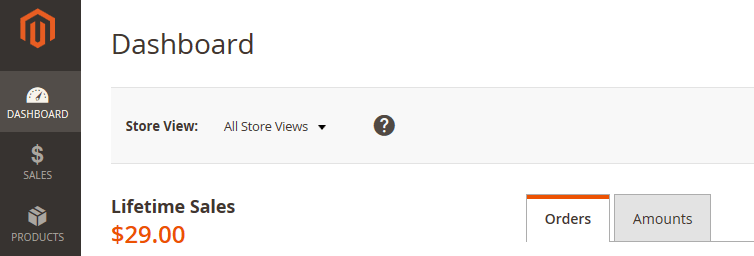Magento vs. Shopify: 2 Top E-Commerce Platforms Compared
- Category : Development
- Posted on : Jun 24, 2017
- Views : 2,721
- By : Odalis J.

Figuring out the best platform to power your e-commerce store is an important decision. Whichever option you land on needs to include all of the features you need and be easy to work with. A couple of our favorites are Magento and Shopify – but even with just two choices, picking the right one can get tricky.
For example, Magento is well-known as a great option for large e-commerce retailers, whereas Shopify is famous for its ease of use. However, neither of them are perfect for everyone, so it pays to know what their features are before making a decision.
For this article, we’re going to introduce you to both platforms, talk about how easy it is to get started with them, and explain how much they cost. Then, we’ll talk about extending their functionality and help you choose the right one for you. Let’s jump in!
Introducing Magento

Magento is powerful e-commerce platform that comes in both hosted and self-hosted versions. Both versions are well suited for stores of any size, and they pack in all of the features you need for an e-commerce platform. If you’re starting a new store, chances are you’ll want to go with Magento’s Community version, which you can set up on any web host you want (including Host SEO).
As far as features go, Magento doesn’t disappoint. It offers built-in Search Engine Optimization (SEO), extensions, order management tools (think wish lists and gift registries), and excellent scalability. Keep in mind though, that Magento is not particularly newbie-friendly. Even so, the platform does offer excellent documentation.
Introducing Shopify

Shopify is one of the most popular hosted e-commerce platforms available. It’s easy to use, modern, and makes a fantastic option for people who don’t have much experience when it comes to e-commerce or building websites.
As a user, the main upside of using a platform such as Shopify is that you don’t need to look for separate hosting. You still have to pay a monthly fee to keep your store ‘open’, but it can take less time to set things up.
When it comes to features, Shopify offers you a drag-and-drop site builder, built-in payment processing, and automatic mobile optimization. You also get access to mobile apps that enable you to manage your store on the go, which is a huge plus. Getting acquainted with all these features is easy too, as Shopify provides you with an extensive collection of guides and video tutorials.
Magento vs Shopify: Ease of Use
We’ve already talked a bit about both platforms’ ease of use, but let’s take a minute to dig in deeper.

Despite having a reputation for being somewhat difficult to use, Magento’s dashboard is very sleek. Setting up the platform is also easy, depending on which web host you use. Most services will enable you to install it through your cPanel, or do it for you based on your plan. It’s a simple process that shouldn’t scare anyone off.

For a platform that’s billed as being very user-friendly, Shopify’s dashboard can actually take some time to get used to. It offers as much data as Magento, and chances are you’ll also need to look through its documentation to get acquainted with how it all works. That being said, Shopify does get an edge when it comes to ease of use simply, because you don’t need to set the platform up to start working.
Magento vs Shopify: How to Extend Functionality
Both Magento and Shopify enable you to extend their functionality. The former does this through extensions, which are available from its Marketplace:

Despite its enterprise leanings, Magento offers an extensive collection of free extensions and premium ones. Best of all, the platform’s open-source roots mean you can modify any of them to your liking (if you know how to do it). This gives Magento an edge when it comes to customization potential.

Shopify refers to its extensions as ‘apps’, but the system works very similarly. The key difference is you don’t need to download or upload any files to set them up. You just pick the app you want from its store, and the platform takes care of the rest. Keep in mind, though – you can’t tweak Shopify extensions. The process may be simpler, but it also limits your options a bit.
Magento vs Shopify: The Costs of Setting Up Stores
As you can imagine, costs vary wildly depending on what type of store you’re looking to set up. If it’s going to be large, theh costs are going to pile up fast – so let’s work with the assumption that you have more modest needs (at least for now).
When it comes to Magento, you don’t need to pay to download or install the platform, but you willneed to look for hosting. Shared plans can be had for quite cheap, and if you’re not looking to set up any premium extensions, you can create an excellent store on a budget. What’s more, Magento is highly scalable, so you can just upgrade your plan whenever you feel it’s needed.
In contrast, Shopify plans start at $29 for the platform’s most basic features. This tier enables you to list as many products as you want, but you can only set up two staff accounts, and you don’t get access to in-depth reports. These are restrictions that Magento users don’t have to deal with.
In short, with Shopify you’re paying a premium for ease of use. If you can afford it and you want a platform that’s easy to pick up, it’s a good choice – but Magento can be a less expensive option with fewer limitations.
Magento vs Shopify: Which Platform Is Best For You
So far, we’ve covered all of the major points to help you make an informed decision, so let’s recap our findings quickly. Here are our suggestions based on what you’re looking for in an e-commerce platform:
- Magento: If you want a platform offering full customization, with functionality that can be extended to your liking, this is a good option for you. The learning curve can be a bit tough, but there’s thorough documentation to help you out, and getting started isn’t too expensive.
- Shopify: It’s clear that Shopify is the easier platform to use. However, this comes at a premium, since prices start at $29 per month for semi-limited features. If you don’t mind the price tag and the two-member limit on your staff, Shopify will be a good option.
Keep in mind that neither platform is perfect for every situation. If you have the opportunity to test them out for yourself before settling on one, go for it!
Magento vs Shopify Conclusion
Magento and Shopify are both great options for setting up an online store. However, they also offer quite a different set of features. If you want to pick the right one for your needs, you’ll need to know what they provide.
Let’s take a moment to go over the main differences between the platforms once more:
- Magento: This is a robust and scalable platform that you can set up cheaply.
- Shopify: This managed option is an excellent choice if you’re looking for a hosted alternative.
When comparing Magento vs Shopify, do you have any questions about which of these two platforms would make a better fit for you? Let’s talk about them in the comments section below!
Categories
Subscribe Now
10,000 successful online businessmen like to have our content directly delivered to their inbox. Subscribe to our newsletter!Archive Calendar
| Sat | Sun | Mon | Tue | Wed | Thu | Fri |
|---|---|---|---|---|---|---|
| 1 | 2 | 3 | 4 | 5 | 6 | |
| 7 | 8 | 9 | 10 | 11 | 12 | 13 |
| 14 | 15 | 16 | 17 | 18 | 19 | 20 |
| 21 | 22 | 23 | 24 | 25 | 26 | 27 |
| 28 | 29 | 30 | 31 | |||
Recent Articles
-

Posted on : Jul 25
-

Posted on : Jul 07
-

Posted on : Apr 07
-

Posted on : Mar 19
Optimized my.cnf configuration for MySQL 8 (on cPanel/WHM servers)
Tags
- layer 7
- tweak
- kill
- process
- sql
- Knowledge
- vpn
- seo vpn
- wireguard
- webmail
- ddos mitigation
- attack
- ddos
- DMARC
- server load
- Development
- nginx
- php-fpm
- cheap vpn
- Hosting Security
- xampp
- Plesk
- cpulimit
- VPS Hosting
- smtp
- smtp relay
- exim
- Comparison
- cpu
- WHM
- mariadb
- encryption
- sysstat
- optimize
- Link Building
- apache
- centos
- Small Business
- VPS
- Error
- SSD Hosting
- Networking
- optimization
- DNS
- mysql
- ubuntu
- Linux








